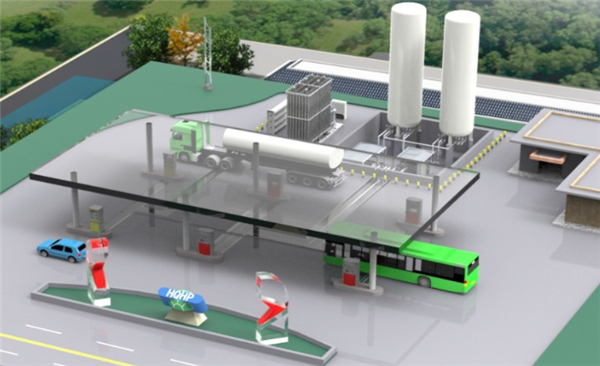20,000 hydrogen filling stations may be needed in 2030 in China
Shanghai (Gasgoo)- Miu Ping, the assistant to the president of the National Institute of Clean and Low-carbon Energy (NICE) in Beijing and director of the New Energy Center said there would be two million fuel cell electric vehicles (FCEVs) in China in 2030. Correspondingly, 4-8 million ton hydrogen and 20,000 hydrogen filling stations would be needed. He also suggested that the most ideal method for hydrogen generation through water electrolysis was using wasted electricity, instead of industrial electricity.
Figures from the National Energy Administration showed around 100 billion kWh output generated by renewable energy, including water, wind, solar and biomass power, was wasted annually in 2017 and 2018, which was a result of unsynchronized power and non-intelligent distribution of electricity. If these could be utilized to produce hydrogen, around 18.6 million ton hydrogen would have been obtained.
About 30 million ton hydrogen, generated from coal, ammonia, methanol and the chlor-alkali process, is expected to be provided to meet the needs in 2021-2025 or even 2026-2030.
It is suggested that the hydrogen fueling stations should be built near the place where there are hydrogen and other energy sources.

(Photo source: Houpu)
Realizing safety and intelligent management
Liu Shaojun, the general director of Shanghai SunWise New Energy System Co. Ltd., indicated there were three crucial facilities of hydrogen filling infrastructures—hydrogen dispenser, compressor and storage container. It was very important to accelerate the localization of the core equipment to lower the cost of the infrastructures, said Mr. Liu.
Another issue is the safety, according to Chen Lijuan, deputy technical director of the Air Liquid Houpu Hydrogen Equipment Co., Ltd., a joint venture of Air Liquide Advanced Technologies S.A. and Chengdu Huaqi Houpu Holding co., Ltd (Houpu). She said it was almost impossible to extinguish hydrogen flames, and the most effective way was to take advantage of high-temperature steam to control them.
She advised that the safety management and then the intelligent one should be realized. In addition, the construction of filling infrastructures need be in strict accordance with the international norms to guarantee their quality. Mr. Liu said the safety system included technological prevention as well.
Gasgoo not only offers timely news and profound insight about China auto industry, but also help with business connection and expansion for suppliers and purchasers via multiple channels and methods. Buyer service:buyer-support@gasgoo.comSeller Service:seller-support@gasgoo.com







